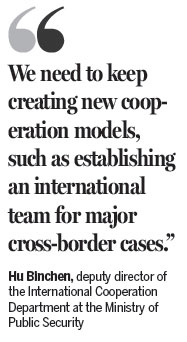Nation vows improved efforts to fight terror
By He Na in Nanning, Guangxi (China Daily) Updated: 2015-05-15 07:30Cooperation with ASEAN members will be stepped up, senior security official tells forum
China has vowed to improve cooperation on counterterrorism and transnational crimes with countries in the Association of Southeast Asian Nations, a senior security official said on Thursday.
He said ASEAN countries have made great achievements in economic development, peace and cooperation.
"However, ... the activities of terrorist organizations in the region are becoming more frequent," said Hu Binchen, deputy director of the International Cooperation Department at the Ministry of Public Security.
"This includes using the Internet to promote their ideas, recruit new members and raise funds. The region is also facing more severe safety challenges than ever," Hu said.
He was speaking at the 13th ASEAN Regional Forum in Nanning, capital of the Guangxi Zhuang autonomous region, to discuss counterterrorism and transnational crime.
The Internet has become a major tool for planning and promoting terrorist attacks, requiring great attention from all countries, Hu said.
Since being founded in 1994, the regional forum has become a key opportunity for consultation and dialogue, with the aim of preventing future conflict in the Asia-Pacific region. It has 17 member countries.
Hu called for a new sustainable regional security cooperation system to be set up and for zero tolerance for terrorism and cross-border offenses involving illicit drugs, human trafficking and transnational organized crime.
"Besides enhancing the cooperation mechanism and increasing talent exchanges and training, we need to keep creating new cooperation models, such as establishing an international team for major cross-border cases," he said.
Pan Guanyuan, an official at the Public Security Ministry's Network Security Bureau, said: "The Internet has no borders. Cracking down on the Internet being used to promote terrorism cannot be accomplished by a single country.
"However, due to differences in laws and policies in different countries, it's really hard to realize effective cooperation.
"We are calling for a multilateral transparent Internet security system to be set up on the basis of mutual respect in ASEAN," Pan added.
Delegates and regional security experts from other countries shared their experiences and suggested ways to better cope with terrorism and cross-border crime.
Vickie Miller, a senior policy officer at New Zealand's Counterterrorism, International Security and Disarmament Division, said cracking down on terrorism promoted on the Internet is very important, but added that this should not hinder Internet freedom.
"We should follow the basic rules to rethink our behavior, including adhering to international laws," she said, adding that some clauses could be added to international laws to build trust and standards on the issue.
Herry Sudradjat, director of the Regional and Multilateral Cooperation Bureau at Indonesia's counterterrorism agency, said, "Many countries, including ASEAN members, encounter problems of terrorists in their countries managing to join terrorism organizations in some Middle East countries.
"As far as I know, China also has such problems. It is not an issue for one country, but for all of us. Indonesia is an Islamic country, and we want to take more responsibility to cope with these new crimes. We are also willing to cooperate deeply with more countries."
Huo Yan contributed to this story.
hena@chinadaily.com.cn

- Govt encourages people to work 4.5 days a week
- Action to be taken as HIV cases among students rise
- Debate grows over reproductive rights
- Country's first bishop ordained in 3 years
- China builds Tibetan Buddhism academy in Chengdu
- Authorities require reporting of HIV infections at schools
- Typhoon Soudelor kills 14 in East China
- Police crack down on overseas gambling site
- Debate over death penalty for child traffickers goes on
- Beijing to tighten mail security for war anniversary







